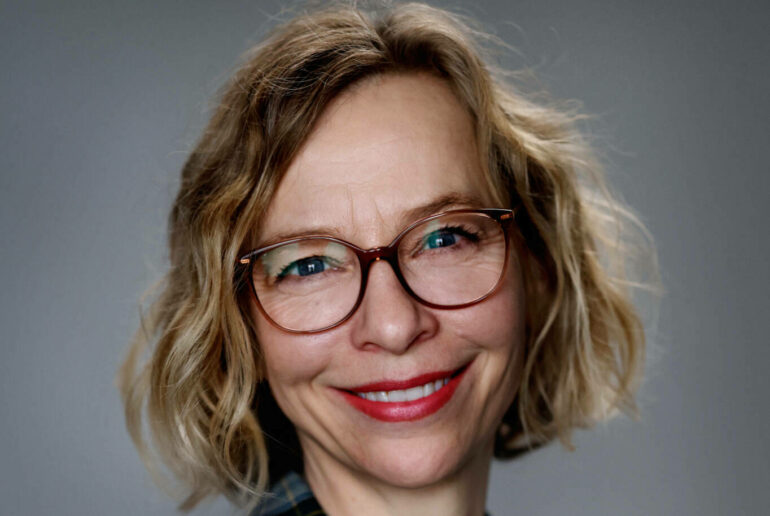Written by: Per Laursen
14.08.24
New CEO of the Danish Producers’ Association wants a recovering market to reach its full potential, financially and creatively, while navigating changing times.
In recent years, the Danish film/TV industry has experienced a historic economic downturn exacerbated by internal discord. Now the industry welcomes a new CEO for the Producers' Association, as the Nordic production market slowly recuperates. The goal is to recapture the dynamics and output of the golden years while navigating technology, legal intricacies - and politics.
“I am sure that the Danish and Nordic market will recuperate and grow to its full potential, financially and creatively, while tackling changing market conditions,” the new director of the Danish Producers' Association, Anna Porse Nielsen, told NFTVF.
Nielsen will take the position on 12 August and replace Jørgen Ramskov, who has been director of the Danish Producers' Association since 2019. Nielsen holds an MSc in Political Science, and was for many years head of her consulting firm Seismonaut, which she divested in 2023. She has most recently held a position as political director at the musicians’ rights association, Koda.
The Producers’ Association in Denmark resembles associations in Sweden, Norway, and Finland, and represents producers of films, TV, and commercials. The association, which includes both large and small production companies, seeks political influence and serves member’s interests with politicians, rights organisations, public institutions, broadcasters/streamers, and advertising agencies.
The creative world of film and TV is by no means a new field for Nielsen. For most of her career, she has worked at the intersection of business development and policy in the creative and cultural industries, and her background fits the challenges ahead.
"Over the past 20 years, I have participated in securing creative industries a voice on the political agenda. I have worked as an adviser in my own consulting company and as a board member of the Film Talent Foundation, Vision Denmark, and in the animation environment in Viborg,” Nielsen said.
The Danish Producers’ Association and its new CEO face various issues, such as tech, access to talent, issues on rights, politics - and how to secure growth among the members.
“The organisation is about to enter a new phase, because the film and TV industry is rapidly developing and facing new challenges. After conflict and a production slowdown, I envision the Association as tomorrow’s “clubhouse” for the industry, where big and small businesses meet and where we can offer them even better services and inspiration for development. My vision is to move the organisation in the direction of being more proactive in terms of supporting our members when facing the challenges which lie ahead, rather than being reactive,” Nielsen said.
This autumn, Nielsen’s primary focus revolves around technology, rights, financing, sustainability, and nursing talent for future growth.
“Artificial Intelligence as a phenomenon is the big elephant in the room, presenting both amazing opportunities and complex challenges, both creatively and in terms of copyright law and new business models.”
“We face a massive challenge on the issues of copyrights, and we should expect business models to change as rights conditions change. It is a huge challenge for the industry, and has the potential to become a game-changer for all. Still, I am optimistic. In the wake of the Danish rights conflict in 2022 (writers and other creatives entered negotiations with streamers, ed.), my impression is that international streamers will continue to produce valuable local content for their Nordic subscribers, and will adapt to local traditions and values,“ Nielsen said, interjecting that big global streamers are also subject to Nordic competition for subscribers.
“Furthermore, the Danish industry is extremely innovative, and we have proved again and again that we can adapt and exploit both new technologies and new business models,” she added.
Nielsen’s objective is to support the industry as it hopefully moves into a new golden age, both in terms of the number of productions and investments.
“There is a growth potential after two troublesome years, but releasing the potential requires a willingness among the members to change, and I dream that we - as their organisation - can help them accomplish this.”
On Nielsen’s political agenda for 2024 and 2025, one headline stands out; Denmark does not offer production incentives.
“Denmark is the only country in Europe apart from Luxembourg that does not offer some kind of production incentive. My predecessor and The Danish Producers’ Association have addressed the issue of production (rebates) incentives for several years, and suffice it to say that the political work is not concluded,” Nielsen said, adding tech and rights to her political agenda:
“AI raises complex questions and legal conflicts on creative rights for all members irrespective of size, which quickly leads to a broader discussion of big tech’s general influence on creative businesses.”
Nielsen has a background in talent development with Film Talent Foundation, and nursing young talent and ensuring access for all types of talent to the industry is also close to her heart.
“I believe the Danish Producers’ Association has an important role to play when it comes to creating a sustainable industry. Both when it comes to social sustainability, which starts with talent development and recruitment, and also when it comes to making the industry greener. A lot of work has been done in both areas in recent years, but we need to do more,” Nielsen said.
All Nordic countries have their own Producers’ Associations, which are quite similar to each other, and Nielsen sees potential for more cooperation.
“The Nordic organisations are not quite the same, but there is potential for a closer exchange of ideas and knowledge. After all, the film and TV business is international, and the Nordic countries represent a small region in the big picture. I would like to see more collaboration, not just between Nordic countries, but a broader reach to neighbouring countries. Not collaborating doesn’t make sense.”
